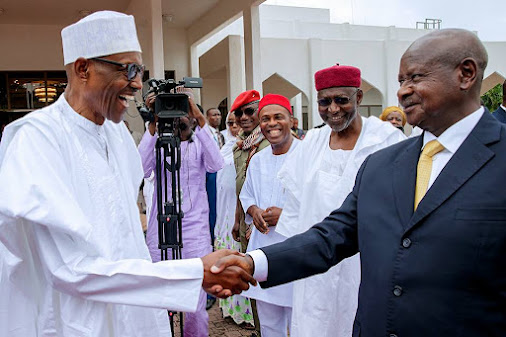By Olusegun Samuel
I am using the word ‘democrats’ in a guided manner in this article because our so-called democrats got elected, though some of them have spent decades in power and are all through constitutional means.
*Buhari and MuseveniWith the current situation in Nigeria, some parts of Africa and the rest of the world, a strong central government might not necessarily be the solution. Neither do we need a powerful, all-knowing ‘monarchical’ ruler to oversee the affairs of a nation. This is certainly the scenario we find ourselves in Nigeria- my native country- despite being in a so-called democratic government.
These
life presidents, despite their frailties, have turned their countries into
their private fiefdoms, while still masquerading as democratic governments.
While the rulers and their cronies thrive, the countries shrink and wither, and
ultimately implode.
Some
of these countries have been turned into a banana republic, being run like a
family dynasty. When Gnassingbe Eyadema died in Togo on his way to France after
a sudden heart attack, his son, Faure, took over. The father spent over 20
years in power and the son took over, reminiscent of the royal dynasty of old.
It was an old trick borrowed from DR Congo when Laurent Kabila was assassinated.
The same for Equatorial Guinea, the only Spanish-speaking African country,
which is currently run by a brutal dictator since 1979 when he violently
overthrew his uncle in a coup-de-tat. The First Family is stunningly rich,
while the rest of the population is poor, feeding from the crumbs of the
presidential table.
Sudan
was ruled by Omar al-Bashir who had an iron grip on the nation until a
nationwide protest swept him off via a military coup.
In Côte d’Ivoire,
Alassane Ouattara won a controversial third term in office in an acrimonious
election after completing his second term. He had manipulated the country’s
parliament to amend the constitution to enable him to contest for a third term
in office.
His predecessor, Laurent Gbagbo, ended up in
prison after he was charged with war crimes. His offence: refusal to hand over
power to this same Ouattara when the latter won the election and unleashing the
Armed Forces on innocent protesters.
The President of Uganda, Yoweri Museveni, has
been in power for over three decades, is still power-hungry and has refused to
yield to another person or the opposition. Rather, there was a wide crackdown
on protesters across the country. It almost degenerated into genocide.
Unfortunately, in all these, the African Union
has remained complacent as regards the excesses of some of its member states on
the infringement of the rights of their citizens. No wonder the recent coups in
West Africa were widely accepted by the people.
There have been successful coups d’état in
Mali, Guinea, Burkina Faso, Niger Republic and lately, Gabon. It is either in
those countries that had sit-tight rulers or the ones who rigged their ways
into power. It is instructive to note that the forceful change of government
was widely embraced by the people of these countries.
Countries like Nigeria and South Africa that
should lead the continent in democratic ideals are not faring better. Nigeria
keeps regressing in democratic ethos and governance. Nigeria, the largest black
nation on earth and the biggest black democracy, is sluggish in implementing
democratic reforms. Since Nigeria’s return to democratic rule in 1999, the
expected consolidation of democracy has not materialised. Rather, we have those
trying to perpetuate themselves in power.
*Olusegun
Samuel is a commentator on public issues


No comments:
Post a Comment